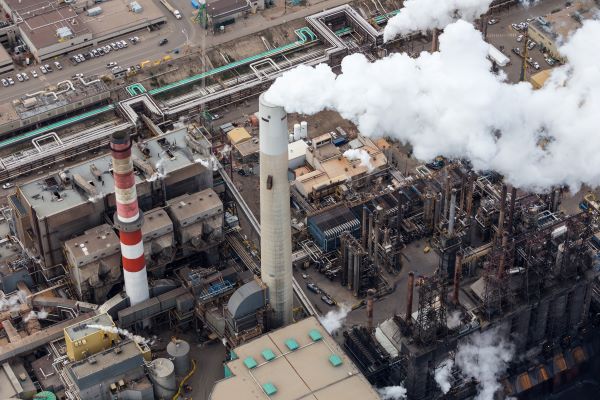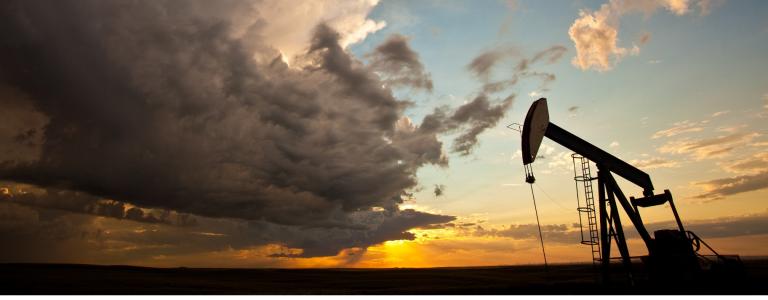Doubling Down on Alberta's Oil and Gas Sector Is a Risk Canadians Can’t Afford to Take
There's no question that people across Alberta need urgent help. But is injecting tens of billions into oil and gas corporations the right kind of help?
In times of unprecedented crisis, government leadership means being bold. But as Canada and its provinces prepare to roll out record-breaking emergency responses to help the newly jobless and throw lifelines to drowning sectors, it’s becoming clear that not all support is created equal.
Alberta Premier Jason Kenney announced Tuesday that unemployment could rise to at least 25%, or upwards of 500,000 workers. To bolster Alberta’s economy, he called for the federal government to commit at least CAD 20 billion to CAD 30 billion in liquidity for oil and gas producers. This came on the heels of the province’s announcement last week of almost CAD 8 billion in equity infusion and loan guarantees for the Keystone XL oil pipeline. There have also been calls for the feds to purchase oil and gas sector accounts receivable at a discount. For its part, the federal government is finalizing the specifics of their promised emergency response package for the sector.
As Canada and its provinces prepare to roll out record-breaking emergency responses to help the newly jobless and throw lifelines to drowning sectors, it’s becoming clear that not all support is created equal.
There’s no question that people across Alberta need urgent help. In the accommodation and food service sector alone, nearly 100,000 workers have already lost their jobs, and similar numbers seem likely in retail trade. The oil and gas sectors have seen thousands of layoffs and postponed labour as the province’s companies limit production and shelve all plans for expansion, upgrades, and maintenance.
Two Key Features When It Comes to a Strategic Response
Is injecting tens of billions of dollars into oil and gas corporations the right kind of help? As well as addressing immediate needs, the strategic emergency response should have two critical features:
- It should address the root causes of the crisis and reduce vulnerability to future crises.
- It should take advantage of the dynamism that crisis creates to build back better and achieve important public policy goals that may have been harder to reach in more settled times.
Would the proposed assistance address the root causes of the crisis? Alberta’s economic crisis started well before COVID-19 and is rooted in overdependence on inherently cyclical commodities: oil and gas. But rather than pursue diversification that could shelter Albertans from the pain of future shocks, these sorts of investments double down on the status quo, hitching the wagon firmly to volatility and uncertainty.

There will be future shocks, whether it’s another 2008-style financial crisis, a climate-induced crisis such as the 2016 Fort Mac fires, or—dare we say it—another COVID-19-style pandemic. Placing heavy bets on the oil and gas sector nearly guarantees we will be here again, with similar social and economic pain for people across the province.
Placing heavy bets on the oil and gas sector nearly guarantees we will be here again, with similar social and economic pain for people across the province.
Bets like these assume the oil and gas sectors will return to business as usual after COVID-19, that demand will be strong for decades in spite of increasing climate change mitigation efforts, that pipelines will be built despite sustained opposition or political delays, and that major producers like Saudi Arabia, Russia, and perhaps the U.S. can reverse course, defy history, and cobble together some sort of supply-limiting deal that makes the sector profitable for high-cost producers.
An Underlying Problem Isn't Being Addressed
Even if all those assumptions prove right and the bet pays off, that success doesn’t address the underlying problem of overdependence—it aggravates it.
Would the proposed assistance take advantage of the opportunity to build Alberta back better? We know that, whether through market forces or government policies, Canada’s oil and gas sector will eventually decline, hopefully, to be replaced by more diversified and sustainable economic drivers. As the head of the International Energy Agency, the UN Secretary-General, and others have recently argued, our response to the current crisis must accelerate this urgently needed transition. If Alberta is to rebuild its damaged house after this unprecedented crisis, why not build a stronger house?
For Alberta and the federal government, this should mean investing tens of billions of dollars in sectors that can bring long-term prosperity for Alberta’s workers and families, such as hydrogen, health sciences, renewable energy, clean transport, sustainable agriculture, innovation in oil and gas well reclamation, and prevention of fugitive methane emissions, building on the province’s world-class institutions and infrastructure and the strengths of its people. It’s frustrating to watch Alberta charge full steam away from that course, committing billions to support the Keystone XL pipeline after using austerity as a rationale to axe popular investment tax credits for high-tech entrepreneurs, and laying off tens of thousands of education workers—the foundation for future prosperity.
The coming economic downturn will swallow up the unprecedented torrents of financial support we’re assembling and still call for more. But let’s remember that this spending can be a historical force for positive change to ensure that when we come out the other end, our society is more equitable, sustainable, and resilient—ready for whatever the future might throw at us.
Funded by
You might also be interested in
Green Strings: Principles and conditions for a green recovery from COVID-19 in Canada
Endorsed by Canada's leading environmental groups, this paper sets out seven "green strings" recommendations to apply to government measures to ensure a green recovery from COVID-19.
Help Canada’s workers now—but don’t lock us into a high-carbon future
Times of high unemployment and low interest rates are the right time for new, low-carbon investments and infrastructure.
Who Will Pay for Alberta's Orphan Wells?
Alberta's orphan wells require proper decommissioning to prevent harm to the environment and surrounding communities. Who will pay for this?
G20 Recovery Packages Benefit Fossil Fuels More Than Clean Energy
Are we building back better? EnergyPolicyTracker.org features weekly updated analysis of COVID-19 policy responses from a climate and energy perspective.
